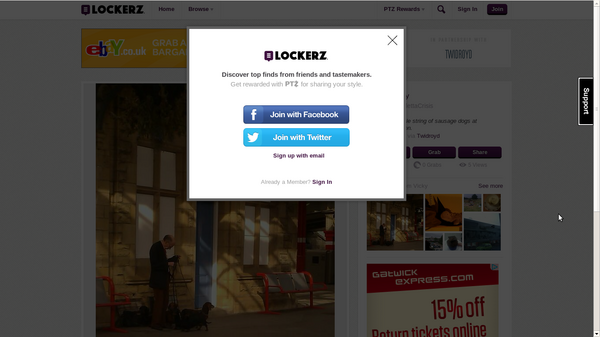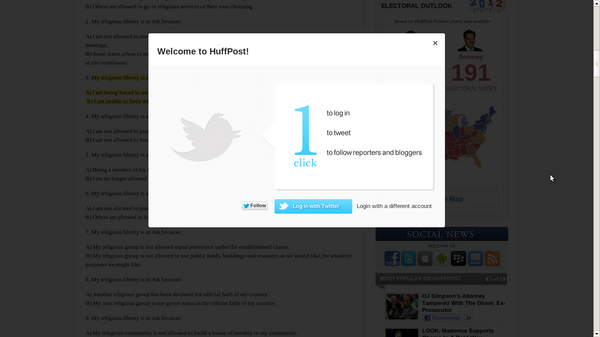The internet needs fewer customers, fewer products and more hippies.
There are two groups of people leaving Twitter at the moment: interesting celebrities who’ve taken enough shit, and angry nerds who don’t like the direction Twitter is going at the moment. Neither party is leaving in droves, but it’s a steady trickle that might easily be a drove’s scout party.
The nerds’ complaints are generally that Twitter has started to act more like a business and less like it gives a damn, which it is and doesn’t. It’s pushing for users to point their eyeballs at the profitable bits of Twitter rather than just the interesting ones, and seems willing to shut down anything that tries to work around that aim. That’s a completely reasonable position for Twitter to take — remember that if you haven’t paid for a service, you’re not a customer but a product — but it’s a bit of a kick in the teeth to the early-adopting developers and users who invented Twitter phone apps, replies, mentions, hashtags, URL shorteners, image hosting services, retweets, search, and basically everything else that makes Twitter different from Google Reader. Things the community felt it owned, Twitter took for its own. And it’s not the first plantation owner in the digital sharecropping economy to do so.
But that’s the problem: Twitter is a business, and probably so is your calendar, email, newspaper, address book, photo album, to-do list, notebook, social network, blog, RSS reader, backup, and map. There’s always the risk that any one will suddenly vanish, or become something you don’t like, or something nobody likes but that’s incrementally more profitable. That’s why so many websites look like this:


That’s not for the users. Nor are “frictionless sharing”, competitions you enter by spamming your friends, articles you can’t read without sharing them, ‘toolbars’ full of adverts, overlaid and interstitial adverts, automatically-playing audio adverts, articles split across five pages, or big-name websites running adverts that are obviously scams. But that’s the reality of a free internet. The alternative is the ‘premium’ services: ad-free, deliberately nice to use, but the pricing is arbitrary and ridiculous (£10 will get you five weeks of the Times’ iPhone app or two years of the Guardian’s) and most of them are liable to dick you about for a bit then get bought out and shut down by Google or Twitter anyway, because they don’t care about you either. They just have a slightly better motivation to keep you on-side. For now.
There have been two notable attempts to build a ‘people’s’ Twitter, free of these problems. The first was to launch an ‘open’ protocol, OStatus, which is decentralised: the system can run on several servers, and users on one can follow users on another. It’s more of a faff than using regular Twitter but it’s more robust to meddling commercial interests. The second is App.net, which launched with a $50 one-year membership fee and a promise never to shut developers out of their API. The users are paying, the developers are paying, and advertisers are not. You’re a customer, not a product, with all the rights that brings.
I think these are both useful steps in a good direction, but neither solves the problem: open protocols aren’t immune from death-by-committee, basically all OStatus users rely on a free but commercial server such as identi.ca to host their feed, and App.net is still run by a small, unaccountable group. In both cases, we’re not so far from the position as we were in with Twitter, but with an iota more power against a more-apparently benevolent dictator. That doesn’t feel like a long-term solution to me. I remember when everyone thought Google was warm and fuzzy.
Moreover, they feel like very techie solutions, when meatspace has had the tools to solve the problem for years: co-ops. In a co-op, you’re neither customer nor product: you’re a member. An owner, on equal terms with the people who set it up. A customer co-op can’t easily screw its users, because it is its users. I don’t think it’s entirely a coincidence that the Co-operative Bank didn’t seem to miss a stride when the financial sector melted down that time (you remember).
If enough users were willing to buy into a service with centralised resources but distributed control and ownership, they’d have no need to submit to any other interest. These .coop services wouldn’t suffer from centralisation because the service couldn’t do anything without its users’ permission, and nor could it refuse to do anything its users wanted from it. The users want 300-character messages? OK. They want to give free accounts to the unwaged? Done. They want to vote off an unpopular user? Depends on the rules they’d voted in for themselves previously. It’s open to abuse, but if anyone knew of a better system I would hope we’d be using it to run countries.
This might even go some way to protecting beleaguered celebrities. If a loud minority of trolls are making the network unpleasant for well-liked and popular users, then the service has an interest in altering its rules or functionality to remedy that, if only so everybody else can enjoy their chatter. Twitter, on the other hand, is happy to lose the engaging semi-famous as long as Justin Bieber and Kim Kardashian are on hand to drip-feed their absurd fanbase their little snippets of nothing.
It would be harder to set up something like this than something like App.net: as well as all the technical difficulties, you’d have all the organisational difficulties of setting up what is quite a complex decision-making process (and eventually a majority of users are likely to ask for something superficially reasonable but technically impractical). There are organisations already out there to help co-ops get started, though, and people make them work all the time. There are a lot of details that need to be worked out before anything could get off the ground, but I think this is the model best able to replace the obnoxious-but-free/pretty-but-expensive dichotomy for those types of people no longer satisfied with it.
Who are, I think, the sorts of people most likely to join co-ops.